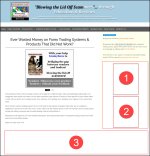- Home
- Forex Articles
- Forex Trading
- It’s OK to be wrong when trading Forex, but it’s not acceptable to stay wrong
It’s OK to be wrong when trading Forex, but it’s not acceptable to stay wrong
by Zahir Shah

“You’re wrong”. It’s a phrase that cuts write to our core and invades our individual DNA. You have to be a strong person to admit that you’re wrong, to accept your limitations and then begin to explore methods in order to correct your mistakes.
Let’s surmise that you’re a parent, offering your child advice on how to argue their points in any given situation, what overall advice could you offer up, that may provide a platform and bedrock, for them to position their communication methods and powers of persuasion, to prove their claims in any conflict situations that may arise? Perhaps suggesting that they should “always argue from a position of facts” could be considered good advice. If, for example; they’re involved in a discussion regarding politics and economics, there’s a wealth of detail to call upon in order to win over an opinion, versus someone using emotive language and a bluffer’s technique, who possesses only a shallow knowledge base.
How we interpret facts is obviously an issue, however, facts and data; if provided from a trusted source, always beats anecdotes and emotional opinion and we should always be ready to simply change our mind, if the facts prove we are wrong.
In trading Forex we deal in a highly factual business, we are overloaded (and at times can be overwhelmed), by the volumes of data we receive; both the fundamental and the technical data. When we’re proven wrong we have no excuse, we can’t blame our failings, or an individual losing trade, on our data. Moreover, we have to accept that being wrong is in many ways a fluid notion. If we’ve followed our trading plan, executed our strategy perfectly, but the trade loses, it doesn’t necessarily suggest that we were wrong, in the accepted translation of the word, the market simply went against us, it happens.
What is unacceptable in trading terms, is to continue to be proven wrong and not make any attempt to rectify the mistakes we’re continually making. This stubbornness and refusal to accept our failings, can prove to be a highly destructive force, working against our trading success. Such an issue must be addressed, before it becomes so damaging that it harms our career.
We know that we can’t bend the market, to suit our trading plan and strategy. We know that the market has to come to us. In some ways, we’re like an effective angler; we prepare our rod with our bait, cast our line, then sit patiently and wait for the bite. We’ve established where the fish might bite, we’ve prepared our kit perfectly, and we accept there’s very little we can do other than ensuring we remain vigilant to make short term decisions as and when necessary.
We need to bury our frustration at being wrong and welcome it in our early trading days. Whilst this may appear to be bizarre advice and a contrary notion, it’s worth noting that without working out (for ourselves) what works and what doesn’t, then it’s impossible for us to build a trading plan and ultimately a career in the retail trading industry. We have to be proven wrong many times during our fledging months, in order to establish what’s right.
Content and Image sources: FXCC Forex Broker, Dailyforex, Learntotradethemarket





